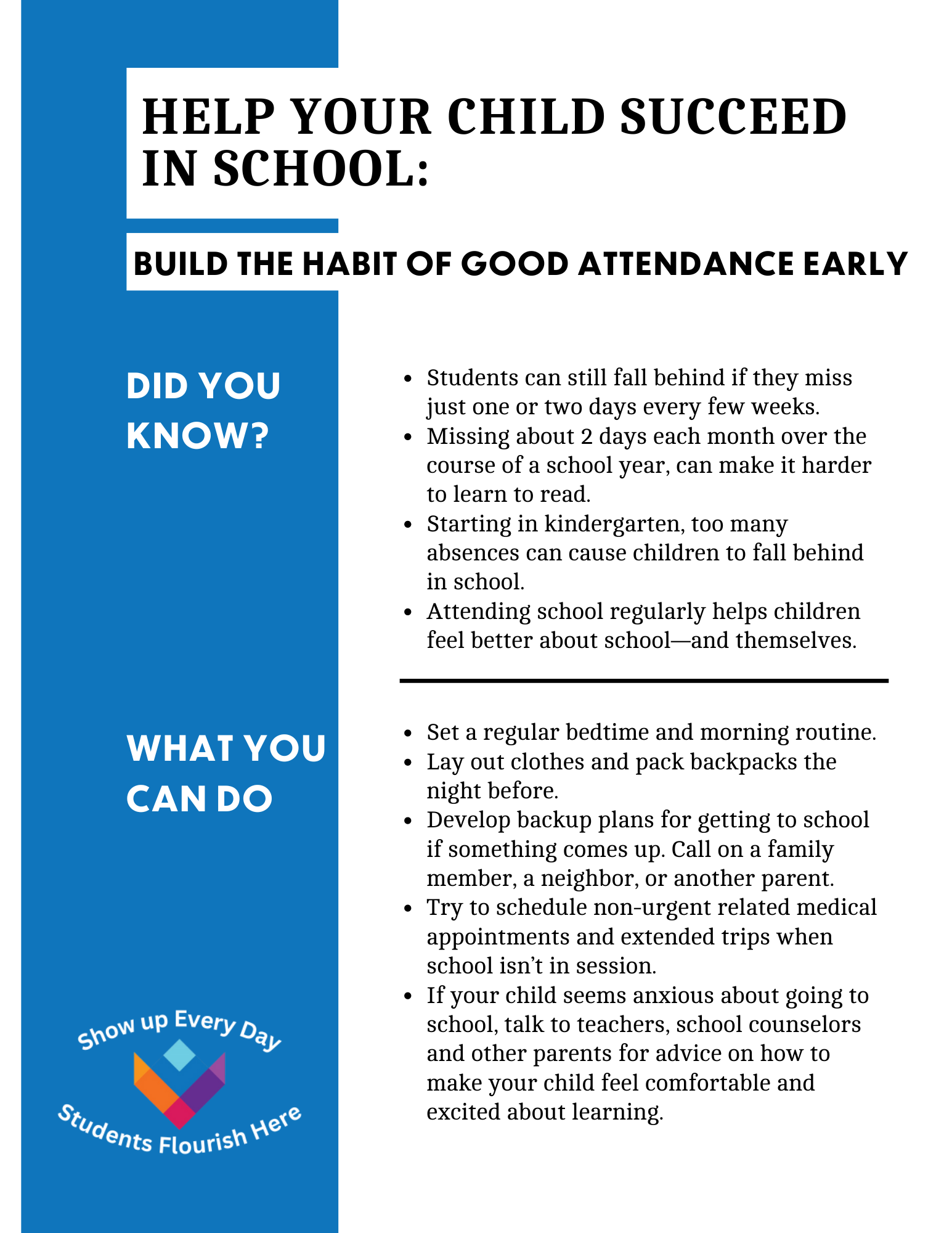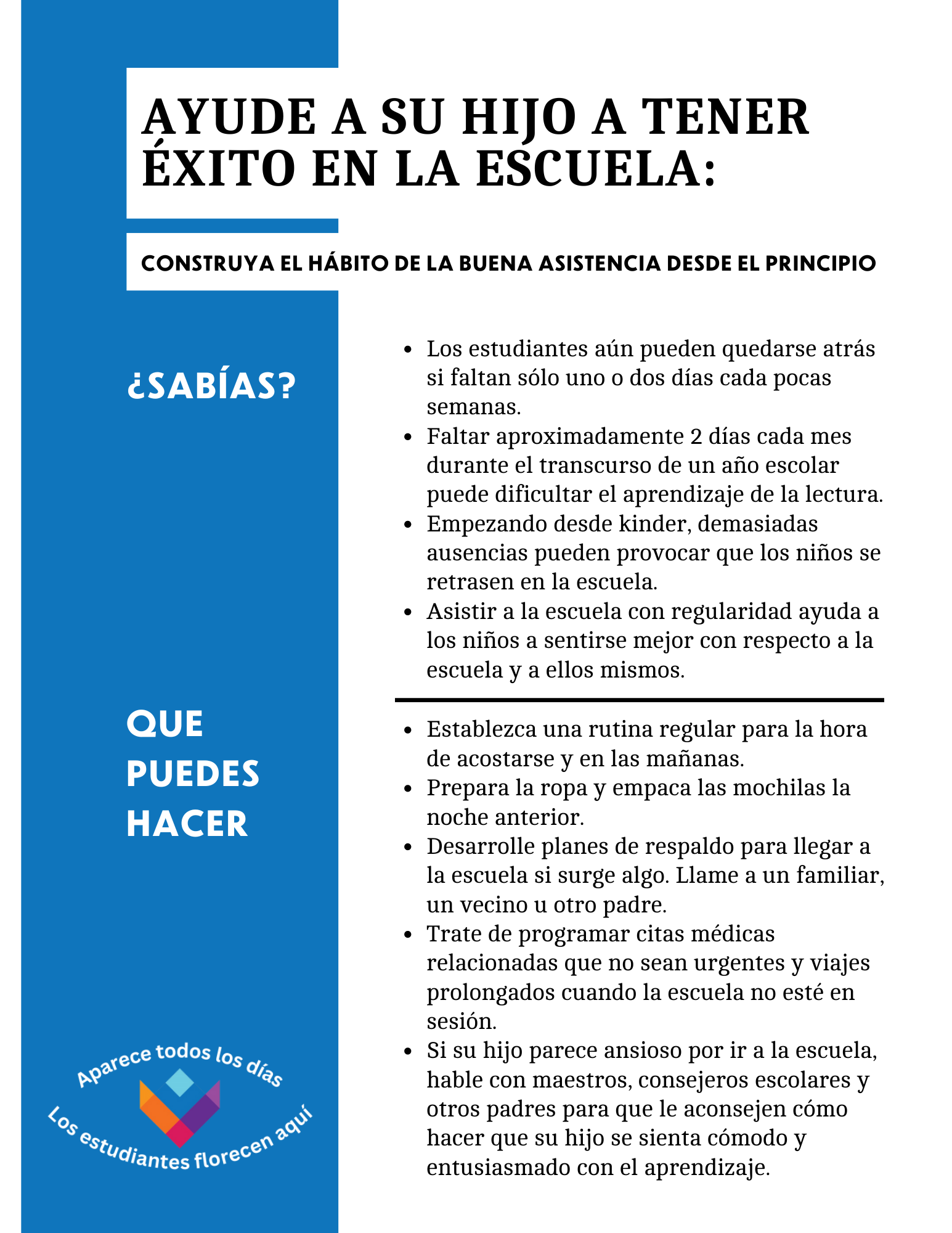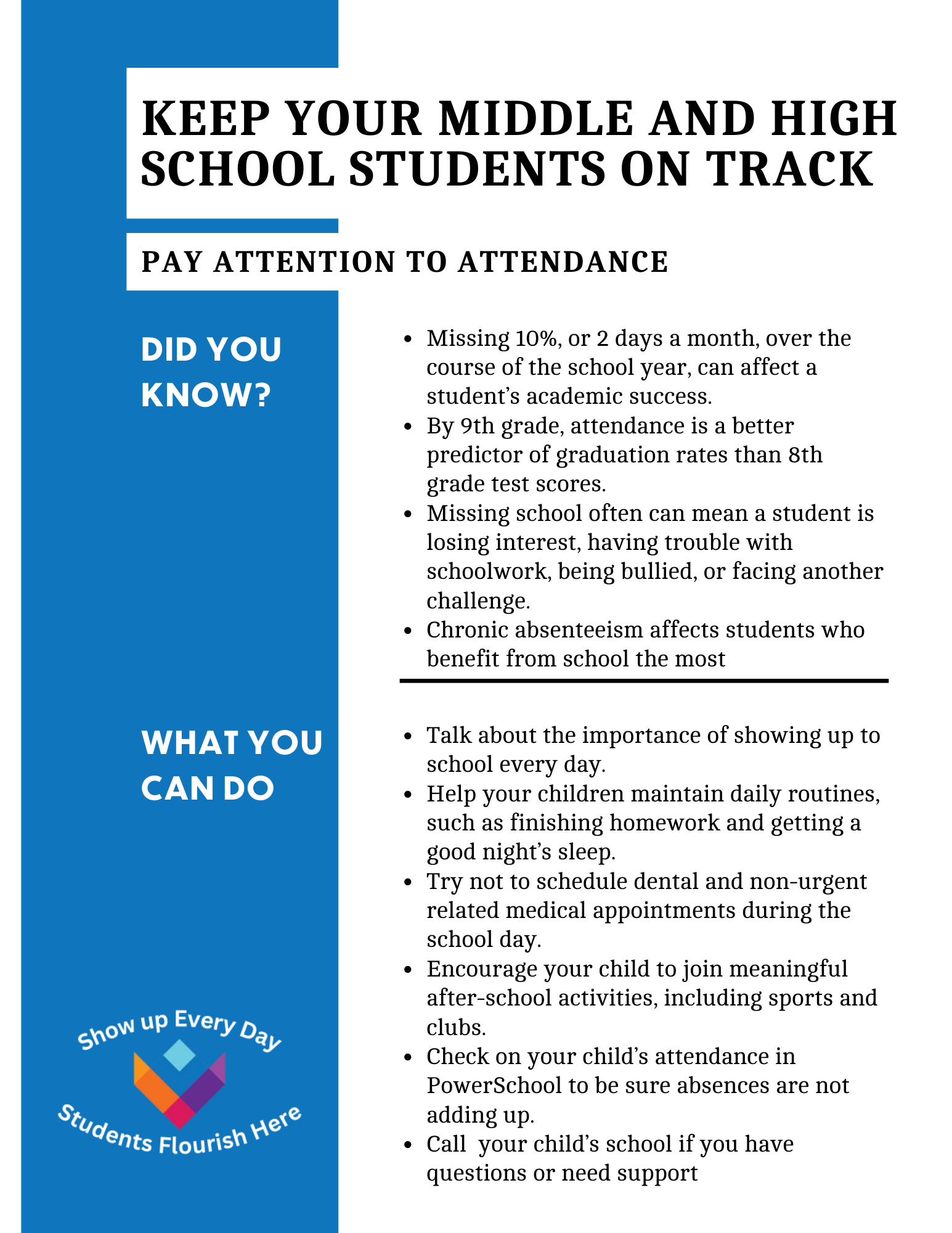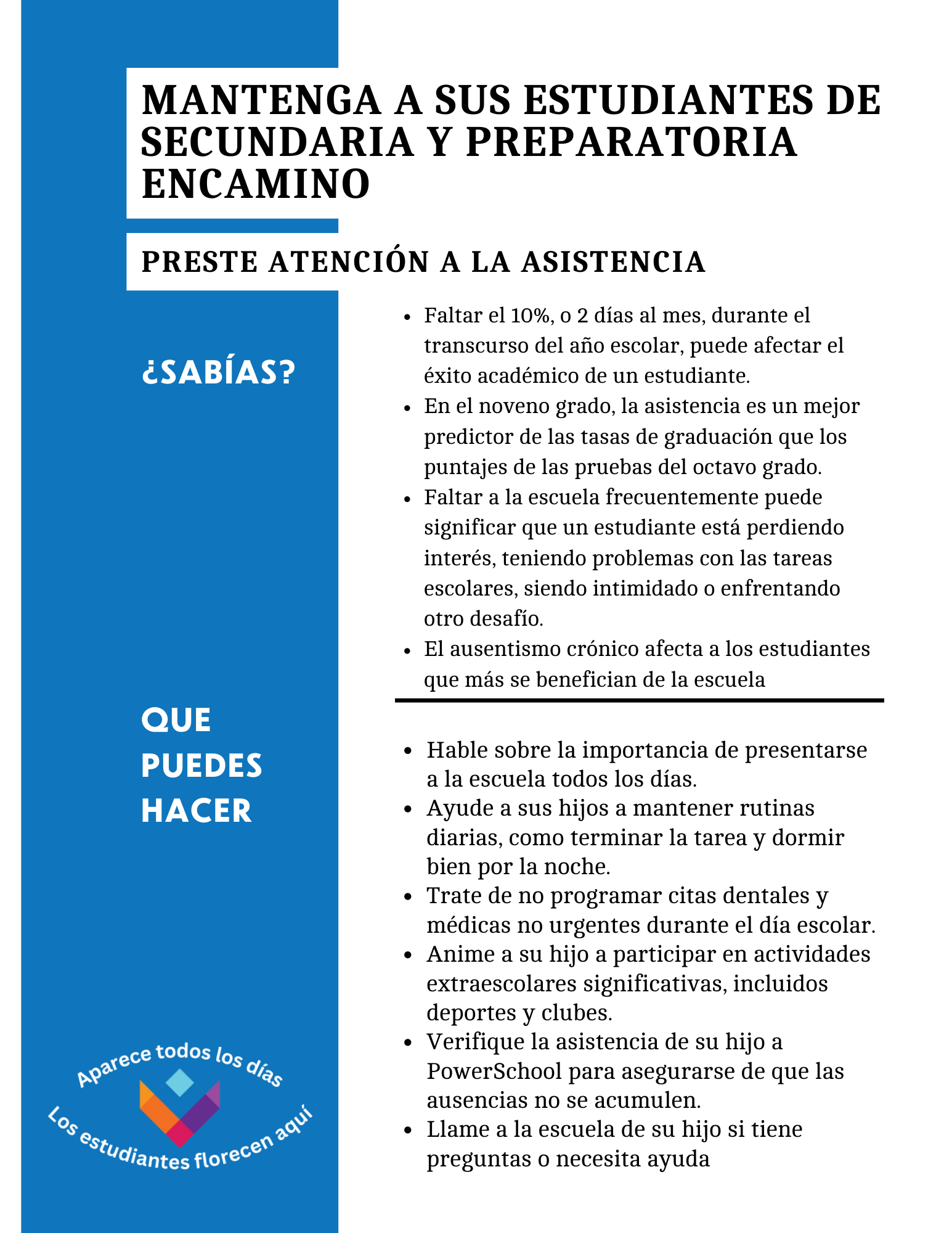
In Jefferson County School District 509J, we believe that students flourish in our schools. They do this in a number of ways. Whether a student is engaged with a lesson in their classroom, connecting with one of the many resources we have available in our schools to serve our families, particpating in a club, activity, or athletics. There are countless ways for our students to flourish. In order for that to happen, they need to be at school.
Attendance is critical for our students. We strive to make school a place where our students want to be day in and day out. Our goal is to make our schools a welcoming place for our students, families, and our staff. We want our schools to be a place where our students develop meaningful relationships with one another, their school staff, and administration.
Chronic absenteeism is defined as missing 10% or more of school days for any reason (including excused, unexcused and behavioral absences). That’s equivalent to about 18 missed days over the course of an academic year. For our youngest students, missing about 2 days each month over the course of a school year can make it harder to learn to read. By 9th grade, regular attendance is a better predictor of graduation rates than 8th grade test scores. Attending school regularly can help children feel better about school and themselves.
Did you know?
1 in 6 Oregon children is chronically absent
In Oregon, students are considered chronically absent when they miss 10% of the school year, or 18 days.
This significantly compromises a child’s ability to read at grade level by the end of third grade.
This lost instructional time exacerbates dropout rates and achievement gaps
Missing School Adds Up
Two Days Absent Every Month:
20 Days missed each year
Means your child missed more than 10% of the school year
This means your child is considered chronically absent from school. Even if the absences are excused.
Students who are chronically absent are less likely to succeed academically and more likely to drop out of school.
Help Your Child Succeed in School: Build the Habit of Good Attendance Early
Did you know?
- Students can still fall behind if they miss just one or two days every few weeks.
- Missing about 2 days each month over the course of a school year, can make it harder to learn to read.
- Starting in kindergarten, too many absences can cause children to fall behind in school.
- Attending school regularly helps children feel better about school—and themselves.
What you can do
- Set a regular bedtime and morning routine.
- Lay out clothes and pack backpacks the night before.
- Develop backup plans for getting to school if something comes up. Call on a family member, a neighbor, or another parent.
- Try to schedule non-urgent related medical appointments and extended trips when school isn’t in session.
- If your child seems anxious about going to school, talk to teachers, school counselors and other parents for advice on how to make your child feel comfortable and excited about learning.
Ayude a su hijo a tener éxito en la escuela: Construya el hábito de la buena asistencia desde el principio
¿Sabías?
- Los estudiantes aún pueden quedarse atrás si faltan sólo uno o dos días cada pocas semanas.
- Faltar aproximadamente 2 días cada mes durante el transcurso de un año escolar puede dificultar el aprendizaje de la lectura.
- Empezando desde kinder, demasiadas ausencias pueden provocar que los niños se retrasen en la escuela.
- Asistir a la escuela con regularidad ayuda a los niños a sentirse mejor con respecto a la escuela y a ellos mismos.
Que puedes hacer
- Establezca una rutina regular para la hora de acostarse y en las mañanas.
- Prepara la ropa y empaca las mochilas la noche anterior.
- Desarrolle planes de respaldo para llegar a la escuela si surge algo. Llame a un familiar, un vecino u otro padre.
- Trate de programar citas médicas relacionadas que no sean urgentes y viajes prolongados cuando la escuela no esté en sesión.
- Si su hijo parece ansioso por ir a la escuela, hable con maestros, consejeros escolares y otros padres para que le aconsejen cómo hacer que su hijo se sienta cómodo y entusiasmado con el aprendizaje.
Keep Your Middle and High School Students on track: Pay Attention to Attendance
Did you know?
- Missing 10%, or 2 days a month, over the course of the school year, can affect a student’s academic success.
- By 9th grade, attendance is a better predictor of graduation rates than 8th grade test scores.
- Missing school often can mean a student is losing interest, having trouble with schoolwork, being bullied, or facing another challenge.
- Chronic absenteeism affects students who benefit from school the most
What you can do
- Talk about the importance of showing up to school every day.
- Help your children maintain daily routines, such as finishing homework and getting a good night’s sleep.
- Try not to schedule dental and non-urgent related medical appointments during the school day.
- Encourage your child to join meaningful after-school activities, including sports and clubs.
- Check on your child’s attendance in PowerSchool to be sure absences are not adding up.
- Call your child’s school if you have questions or need support
Mantenga a sus estudiantes de secundaria y preparatoria encamino: Preste atención a la asistencia
¿Sabías?
- Faltar el 10%, o 2 días al mes, durante el transcurso del año escolar, puede afectar el éxito académico de un estudiante.
- En el noveno grado, la asistencia es un mejor predictor de las tasas de graduación que los puntajes de las pruebas del octavo grado.
- Faltar a la escuela frecuentemente puede significar que un estudiante está perdiendo interés, teniendo problemas con las tareas escolares, siendo intimidado o enfrentando otro desafío.
- El ausentismo crónico afecta a los estudiantes que más se benefician de la escuela
Que puedes hacer
- Hable sobre la importancia de presentarse a la escuela todos los días.
- Ayude a sus hijos a mantener rutinas diarias, como terminar la tarea y dormir bien por la noche.
- Trate de no programar citas dentales y médicas no urgentes durante el día escolar.
- Anime a su hijo a participar en actividades extraescolares significativas, incluidos deportes y clubes.
- Verifique la asistencia de su hijo a PowerSchool para asegurarse de que las ausencias no se acumulen.
- Llame a la escuela de su hijo si tiene preguntas o necesita ayuda



